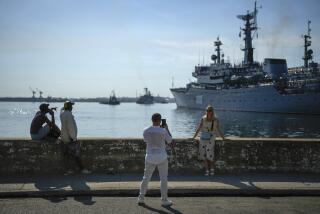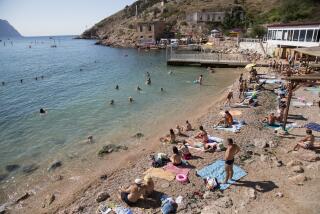Vets’ Passion for Navy Ebbs in Wake of Disaster
- Share via
ST. PETERSBURG, Russia — Up a shabby flight of stairs in a rundown building here is a small, chaotic office that has become the nerve center for relatives and supporters of crewmen trapped in the Russian nuclear submarine Kursk.
It’s not the Russian navy’s rescue center, but a private club. It’s also the home of true believers, many of whom have become disillusioned this week with the military they once served.
The veterans at the St. Petersburg Submariners’ Club have always lived for the navy; they have loved the uniform and all that it represented. The club office--covered with naval flags, paintings of submarines, badges, model subs and insignia--is a testament to their passion.
But this week they watched the navy’s agonizingly slow rescue efforts and saw families let down by the evasions and distortions of navy officialdom.
Club President Igor Kurdin, a former naval officer, started the week optimistically. He believed that a rescue would be carried out swiftly and was relieved that the Kursk, which sank Saturday during a naval exercise in the Barents Sea, was only about 350 feet below the surface and within reach.
But by Friday, the day that officials initially estimated oxygen supplies on the submarine would expire, he was somber and disillusioned.
“The fact that it’s not been done yet just means Russia doesn’t have people qualified for the job,” he said.
With the paucity of information or support from Russian authorities, the crew’s relatives--many of whom were relying on television for their information on the accident--have turned to the St. Petersburg club for help.
People have been walking in off the street to donate whatever money they could. The club is using the donations to buy tickets for relatives to fly to Severomorsk, the headquarters of the Northern Fleet, about 85 miles south of the accident site.
“It’s the absence of information that contributes to the chaos and myths and upsets relatives more than they should be,” said Kurdin, co-author of “Hostile Waters,” a book about the sinking of the Soviet nuclear submarine K-219. He was an officer on the vessel when it went down in 1986.
Television images of President Vladimir V. Putin on vacation this week at the Black Sea resort of Sochi also struck a jarring chord. Putin returned to Moscow on Friday.
“Our phone has been ringing constantly, and I think Putin lost many, many supporters because he stayed in the south on holiday when his real place was in the north at the rescue,” Kurdin said.
There also is growing anger that authorities initially refused foreign help. Though aid was offered Monday, Russian officials waited until Wednesday to accept Britain’s offer of a rescue submersible. The British vessel is scheduled to arrive at the site today.
“Unfortunately, the knocking has stopped, and this means that there is no one left alive,” said Kurdin, referring to the tapping that Russian officials reported was coming from the vessel earlier in the week but since has stopped. Asked why the navy took so long to accept outside help, Kurdin sighed and shrugged, his face blank. When he spoke, his voice was heavy with disappointment: “I just don’t know. They’re idiots.”
The disillusionment is shared by some serving officers, Kurdin said, including an admiral who called him this week.
More to Read
Sign up for Essential California
The most important California stories and recommendations in your inbox every morning.
You may occasionally receive promotional content from the Los Angeles Times.













